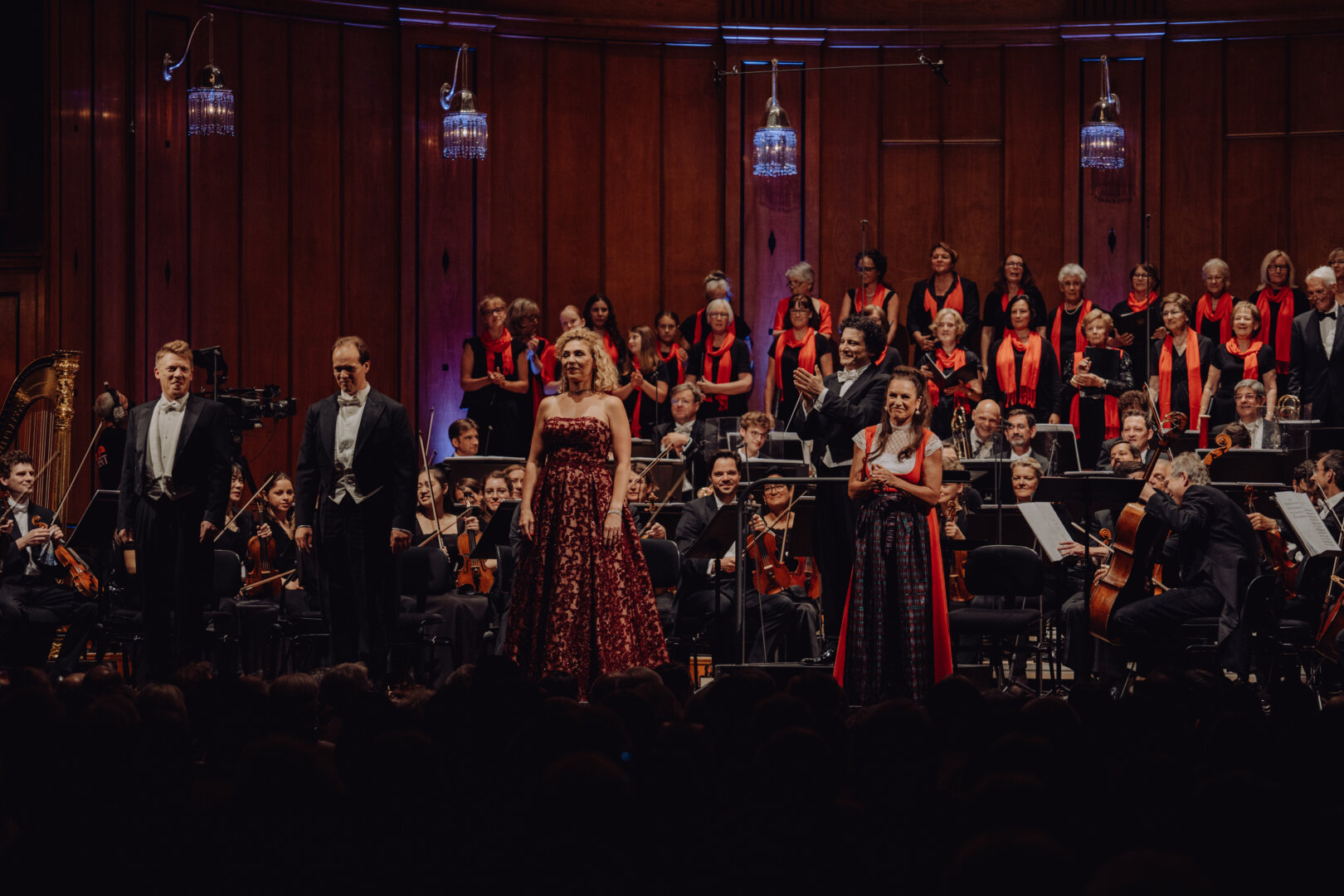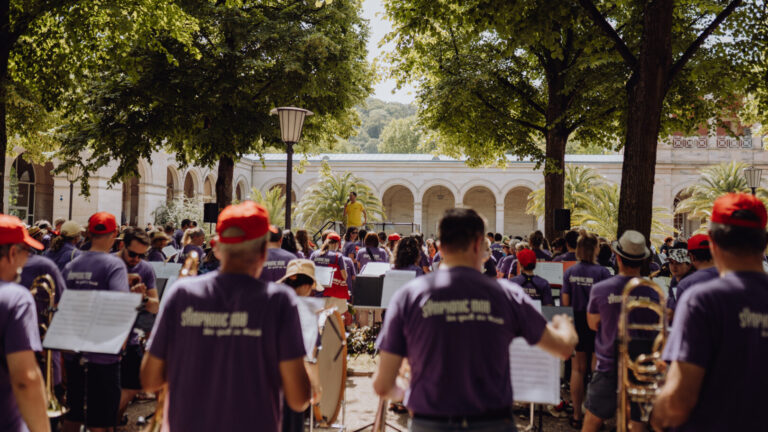“G for Gustav, F for Frankreich, and K for Karajan!” instructed maestro Alain Altinoglu as he conducted a ‘symphonic mob’ rehearsal in the middle of a lovely park in Bad Kissingen, a spa town in Bavaria.
While those capital letters indicated three starting points in the score for his rehearsal purposes, we could readily add B for Bad Kissingen (“Bad” means “bath”) as the geographical starting point for one’s summer musical pleasures that include this event, among a multitude of other delights.
The French/Armenian Altinoglu, just the night before, had conducted the Kissinger Sommer International Music Festival’s opening concert on 17 June. Their appealing theme this year is focused on music from three major cities of the former Austro-Hungarian Empire. This day’s spontaneous ‘mob’ outdoor orchestra (a popular practice in other German cities) included members of the HR (Frankfurt Radio) Symphony Orchestra, the Kantorei Herz-Jesu Bad Kissingen chorale, and local amateur instrumentalists of all ages.
Altinoglu’s jovial personality and musical acumen took these varied forces through a rehearsal and a free concert under the mid-day sun for the benefit of the community. They performed excerpts from works by Bizet, Brahms, Dvořák, and Verdi. This musical outreach was initiated by the festival’s new director Alexander Steinbeis, who stated at the rehearsal: “It’s so important [in this event] for the professionals to play alongside the amateurs; this kind of contact makes the exciting interaction happen.”
Founded in 1986, the Festival’s 2022 edition runs through 17 July in this charming spa town in northwest Bavaria, known as lower Franconia. It features a large roster of international musicians performing music from Vienna, Prague, and Budapest, with touches of jazz, world, and contemporary scores.
A sampling of the most legendary musicians scheduled this year includes the Wiener Symphoniker, the Deutsches Symphonie-Orchester Berlin, Ádám Fischer, András Schiff, Rudolf Buchbinder, Sir Simon Rattle, and Daniil Trifonov. The Hungarian ensembles listed are the Liszt Chamber Orchestra, Roby Lakatos ensemble, and Sárközy Trio, as well as music by Kálmán, Bartók, Liszt, Kodály, Kurtág, Hubay, and Dubrovay are sprinkled throughout the varied programming.
A fountain of medical and musical cures
A world-class spa resort, Bad Kissingen is a fountain of both medical and musical cures. The town’s famous medicinal waters flow from public spigots and professional music-making streams from several beautifully restored Art Nouveau concert and recital halls. Just being in Bad Kissingen is a cure in itself: there is almost no vehicle traffic, the air is fresh, giant green parks are everywhere, and instead of sirens and motorcycles, a joyous bird chorus awakens you in the morning. The town is full of doctors, dentists, psychiatrists, and physical therapists’ offices, as well as numerous healing modalities like Kneipp therapy, salt baths, saunas, and mineral springs.
In the 1860s, Emperor Franz Jozsef and Empress Elisabeth ‘Sisi’ were frequent visitors and a memorial was erected there in her honor in 1907. Other notable visitors during that century were Czar Alexander II and Czarina Alexandra and the Romanoff family, the Bavarian King Ludwig II, Imperial Chancellor Otto von Bismark, George Bernard Shaw, and Richard Strauss. One of the main mineral water springs was named after Prince Ferenc Rákóczy II.
“You, Kissingen, in beautiful Franconia, your small town at the edge of the world, your name’s glory resounds with clarity because God’s blessing has sprung from your fountain!” is the opening quote (from an aficionado from the past) that accompanies Steinbeis’ words and smiling photo in the program booklet. With this poetic entry, he welcomes visitors, letting them know that not only is Bad Kissingen an official member of UNESCO’s List of Cultural Heritage treasures, but is also a compelling purveyor of musical treasures in this, his first program as its director.
Fanfares and “Csárdásfürstin” open the season
What better way to introduce the listener to an opulent era of Hungarian music than the famous score of Emmerich Kálmán’s “Csárdásfürstin.” Fittingly, Kálmán had written this work while visiting two German spas: Marienbad and Bad Ischl. The version for this performance of selected excerpts was unstaged, sung in German, and used the original orchestration from its Viennese premiere. Noted German diva Annette Dasch illuminated the title role with superb vocalism and flirty charm. An additional role (borrowed from Berlin’s Komische Oper production) was added: a non-singing actor who provided a comic character narrative. In this case, it was the famous German actress Christiane Neubauer, known for her many tv productions, such as “Ein Bayer auf Rügen,” “Die Landärztin” or “Die Holzbaronin.” She used a southern accent which added regional humor to the proceedings, especially when she interacted with Altinoglu’s distinctive French accent.
Altinoglu conducted Dvořák’s “Festival Overture” and Liszt’s “Fanfare” to open the concert with the excellent HR (Frankfurt Radio) Symphony Orchestra and the fine-tuned Kantorei Herz-Jesu Bad Kissingen. In an interview the following day, Altinoglu admitted that this was his first time conducting a Hungarian operetta, or any score by Kálmán. “When I conduct Hungarian music, it’s usually Bartók and Kodály, and “Háry János, which is not really an operetta — it’s more folkloric music with folk songs. What I notice about Hungarian music – it’s very interesting, even when we have the German words in the Kálmán — the music retains something very important, because each composer follows the music of the language that he speaks. So, for Hungarian, the stress is on the first syllable. Of course, it becomes more Viennese when you have waltzes in the score [where the beats are slightly delayed] so it gives the flavor of Vienna.”

Having already conducted three times previously at Bad Kissingen with other orchestras, Altinoglu says: “I’m very happy that I conducted the first concert of Alexander Steinbeis’ [first season] – actually all these ideas were his. He said ‘Oh, I’d like to open my first season with a Kálmán operetta!’ I think it’s very clever because it’s fantastic music and very entertaining, and also the audience here knows this music very well.” Indeed, and very romantic too: the man next to me in the balcony seats was singing along with “Csárdásfürstin,” and I saw couples of all ages holding hands as everyone walked out into the lovely night air at the end of the evening.
On the following two days, I also attended concerts by the German cool jazz (with a touch of funk) trumpeter Till Brönner, and the fantastic Fauré Quartet whose program of Beethoven, Josef Suk, and their exhilarating rendition of Brahms’ Piano Quartet #1 known as the “Gypsy Rondo.” That created the perfect segue for the subsequent Roby Lakatos’ sextet concert of gypsy music in the stunning Art Nouveau Kurtheater. Because of the venue’s diminutive size, there was no need for microphones; thus, their virtuosic show was vibrating with palpable intimacy, energy, and surprises throughout their panoply of tunes by Hungarian, Argentinean, Romanian, American, Italian, Dutch, and Russian composers. The last country listed here is that of Rimsky-Korsakoff, whose “Flight of the Bumblebee” was freely interpreted by the group’s cimbalom and drums player, Jenő Lisztes, and pianist Kálmán Cséki, whose astonishing performances dazzled the audience.
My sojourn at Bad Kissingen came to a close in a delightful outdoor evening with a silent film showing of Ernest Lubitsch’s 1919 comedy, “Die Puppe” (The Puppet) with pianist/composer Matan Porat accompanying the film. This was a fascinating historical example of the film industry’s early advances in special effects and editing, but especially styling: the interior set designs, although situated in a German village around 1800, were a fanciful combination of Commedia dell’arte theatre and early 20th century Nouveau décor. The plot is about a girl-shy young man, whose uncle proposes to pay a small fortune to any girl who will marry his nephew. The mis-adventures of everyone who became involved in the scheme culminates in the creation of a faux ‘girl doll puppet’ who agrees to marry the lad. Chaos ensues, followed by true love in the end, of course.
Porat, who was recently praised by the New Yorker magazine’s music critic as a phenom in the niche field of silent film accompanying, played a brilliant score of his own instantaneous creation: a task that was non-stop playing for almost an hour and a half — more than any piano concerto would require. Bravo to Porat, and hats off to Steinbeis for including this unique selection in his first season’s programming.
I await next year’s schedule of musical adventures in Bad Kissingen! The relatively young Kissinger Sommer International Music Festival could soon very well align itself with its established elders — the Ludwigsburger Sclossfestspiele and the Dresdner Musikfestspiele — in providing Europe with imaginative summer music programming in rapturously beautiful historic locations.











